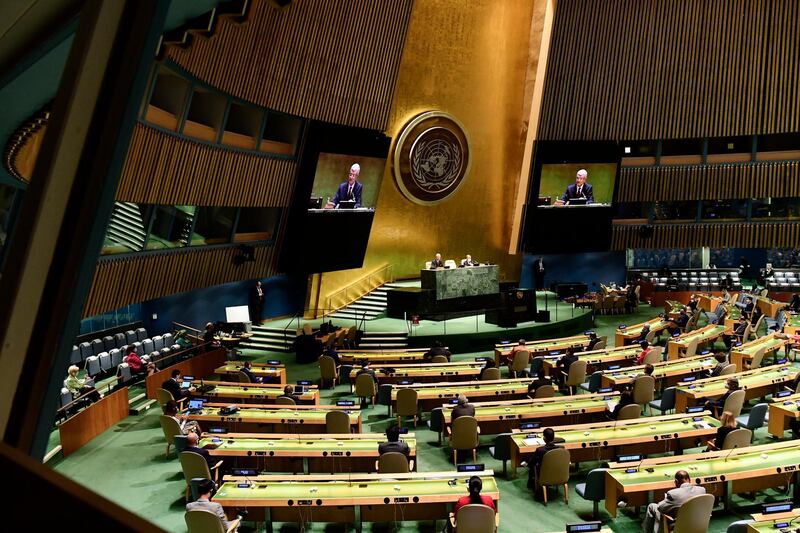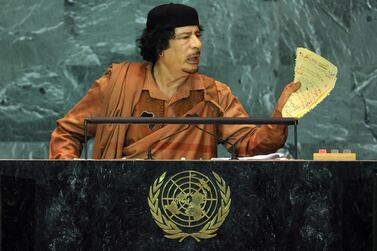The main decision-making body of the United Nations will meet under unusual circumstances this year as the coronavirus pandemic forces the 75th General Assembly to go virtual.
The streets outside New York's UN headquarters will be quieter than usual as the bulk of the 193 UN member states will submit pre-recorded videos rather than attend the event in person.
In an unprecedented move, the week-long general debate, a centrepiece of the summit, will be held online.
Member countries will still vote to pass resolutions on a variety of topics that address current global challenges, but voting will occur under a new set of rules.
Highlights of this year’s summit will include a commemoration to mark the 75th anniversary of the UN, in addition to sessions on biodiversity, women’s rights and the elimination of nuclear weapons.
What is the United Nations General Assembly?
The UN General Assembly (UNGA) is a primary decision-making body within the UN that provides a platform for multilateral discussions to address of some of the world’s most delicate issues, including peace and security matters. The group often delivers recommendations for key global issues through non-binding resolutions.
The first assembly took place in January 1946, with 51 world leaders including the UK’s postwar prime minister Clement Attlee and Prince Fahd of Saudi Arabia, gathering in London to discuss world affairs.
Many of the issues discussed in the first session remain on the programme of discussion today, including refugee rights, nuclear disarmament and peacekeeping.
What is different about this year’s General Assembly?
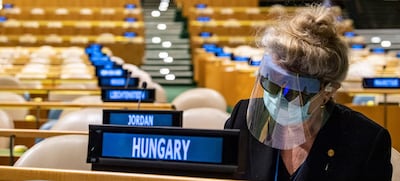
For the first time in its history, the UNGA will be held online, with the scores of world leaders who typically descend on New York City for the annual event staying home.
This year, most world leaders will pre-record 15-minute video speeches, which must be submitted five days prior to their scheduled speaking slot. The new video format will cut down on the rebuttals and improvisations that have occurred in previous years when heads of state met in person.
The videos will be aired in the vast General Assembly Hall and states are allowed to send a New York-based representative to introduce their video.
World leaders are not explicitly barred from attending and may travel to New York to deliver their address in person if they wish to do so.
Voting by member states will transition to a new “silent procedure”. Under this method, draft resolutions will be circulated by the president of the General Assembly and members will have a 72-hour deadline to raise objections. If there are no objections, the resolution will be adopted.
What is the General Debate?
Every year the representatives from each member state – often the head of state – take turns to address the assembly in a week-long General Debate.
Each speech is allotted 15 minutes, although in the past they have frequently overrun. The longest speech in UNGA history was made by the Cuban leader, Fidel Castro, lasting for more than four hours.
This year’s debate will take on a new look and is likely to stick to schedule as speeches will be delivered in pre-recorded videos.
The General Debate has played host to some of the fiercest speeches in political history. In 1974 Palestinian leader Yasser Arafat became the first representative of a non-UN member to deliver a speech, famously making the call for the Palestinian right to statehood.
"Today I came to you with an olive branch of the world in one hand and a weapon of a freedom fighter in another. Do not let the branches of the world fall out of my hand," Arafat said.
The late Libyan leader Muammar Qaddafi threw a torn copy of the UN charter in the air during his 2009 speech while demanding equity between permanent members of the Security Council and the rest of the UN. During his 90-minute speech he called the Security Council a "council of intimidation”.
What is the theme of the 2020 General Debate?
The coronavirus pandemic is front and centre of this year’s theme, which is: "The Future we want, the United Nations we need: reaffirming our collective commitment to multilateralism – confronting Covid-19 through effective multilateral action."
The global pandemic is expected to be a key issue throughout the event, culminating in a September 30 meeting hosted by the World Health Organisation to co-ordinate a stronger global response to the pandemic.
It is an UNGA tradition that Brazil opens the debate. In the early years of the global meeting, countries were reluctant to be the first speaker, but Brazil always offered to go first, said Desmond Parker, the UN’s protocol chief. “And so they have earned the right to speak first at the General Assembly.” The slot is now coveted as it allows Brazil to set the tone for the week’s speeches.
The US traditionally holds the second speaking slot, and President Donald Trump has confirmed he will deliver his address from the White House and not in person this year.
What powers does UNGA have?
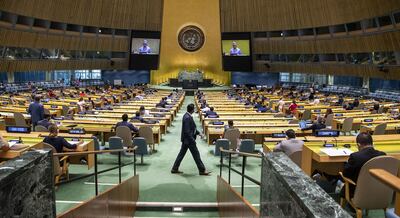
UNGA can make recommendations to member states on international issues. It can initiate actions on political, economic, humanitarian, social and legal issues.
For example, in 2000 UNGA announced the Millennium Development Goals – targets for member states to achieve levels of development and peace.
These were followed up in 2015 with a set of 17 Sustainable Development Goals that were endorsed by member states to protect the environment. The goals were expected to be reached by 2030, but the coronavirus pandemic has slowed progress in achieving them.
UNGA's mandate also includes overseeing UN budgets, electing Security Council members, addressing international peace and security, initiating studies on pertinent international challenges, and recommendations for the peaceful settlement of conflicts.
When is this year’s UNGA?
The 75th session of the UNGA officially opened on September 15.
The General Debate is scheduled for September 22 to 26, and concludes on September 29.
A number of high-level meetings are scheduled, starting with a September 21 commemoration of the 75th anniversary of the UN.
On September 30, a summit is scheduled to address the “unprecedented loss of biodiversity” on our planet.
On October 1, a meeting will be held to mark the 25th anniversary of the 1995 Fourth World Conference on Women that was held in Beijing and attended by Hillary Clinton, who famously remarked at the time “Human rights are women’s rights, and women’s rights are human rights.”
A high-level session will be held on October 2 to mark the International Day for the Total Elimination of Nuclear Weapons. The session will see negotiations for nuclear arms control and disarmament. It comes as the US, UN and Iran are entangled in a dispute over sanctions tied to the 2015 Iran nuclear deal, which Mr Trump withdrew from in 2018.
Who is Volkan Bozkir, president of UNGA
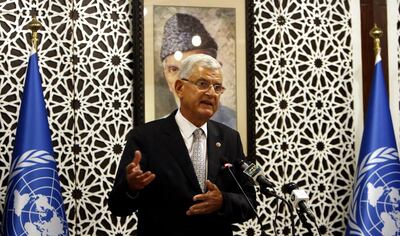
Turkish diplomat and parliamentarian Volkan Bozkir was elected for the one-year term as president of the 75th General Assembly. He takes the reins from Nigerian diplomat Tijjani Muhammad-Bande.
The voting process to determine the 75th president was unprecedented due to Covid-19 restrictions. Wearing face masks and practising physical distancing, ambassadors from UN member states filed into the empty General Assembly Hall in June to cast their ballots during predetermined time slots.
Mr Bozkir is the first Turkish national to become the president of the General Assembly.
We are faced with conflicts, poverty, inequality, humanitarian crises and now, #COVID19. Challenges are substantial. On this 75th year of the @UN, more than ever, we must work together. Those were my thoughts when I rang the #UN Peace Bell today pic.twitter.com/euTrVeMMFf
— UN GA President (@UN_PGA) September 17, 2020
Mr Bozkir’s 39-year career has seen him hold numerous positions, including Vice Consul of the Consulate General in Stuttgart, First Secretary of the Embassy in Baghdad and Permanent Representative of Turkey to the EU. He has been a member of Turkish parliament for nine years, most recently serving as chairman of the Foreign Affairs Committee.
